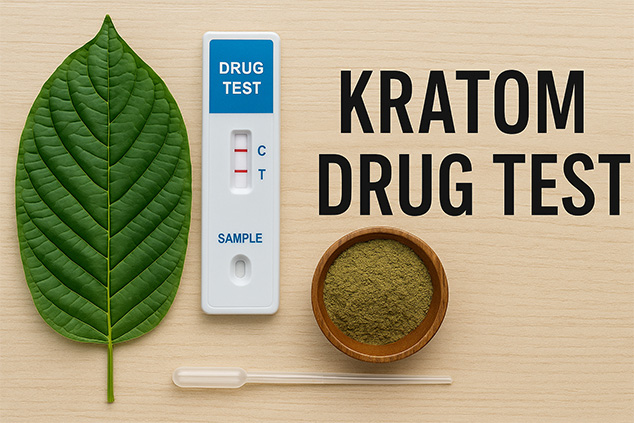With many medical sources and professionals labeling kratom a dangerous drug, you may be wondering if kratom can cause you to fail a drug test. Is there such a thing as a kratom drug test, and can your favorite herb cause you trouble?
As with many kratom-related topics, the answer to this is ‘it depends.”
Typically, kratom should not come up in a drug test that hasn’t been designed to pick up kratom alkaloids. However, it can create a false positive on certain drug tests.
Let’s look at this in more detail.
Kratom Onset, Duration, and Half-Life
When you take kratom, you’ll start experiencing its effects in approximately 10-15 minutes. With some strains, this can be slightly earlier or later. The onset will also depend on whether and how much you’ve eaten. On an empty stomach, the onset may happen sooner while after a large meal, it may take longer.
Depending on the strain you take, you’ll experience peak effects about 1.5 or 2.5 after taking your dose.
Each of the primary kratom alkaloids has a different half-life, the amount of time it takes for the effects of kratom to diminish by half. Mitragynine typically lasts longer – for approximately 4-5 hours – whereas 7-hydroxymitragynine has a shorter half-life – about 2.5-3 hours.
The duration of the effects will also vary based on the type of vein and strain. Fast white strains are normally taken in smaller doses and last the shortest amount of time – approximately 4 hours. Reds usually last for about 6 hours while certain greens are the longest lasting – up to 8 hours.
Keep in mind that these numbers can vary with different strains. The specifics of your body such as your weight and diet can affect kratom duration as well as your experience with the herb.
Nonetheless, even if you no longer experience kratom effects, the majority of alkaloids still remain in your system for a total of approximately 24 hours. This is how long it takes for your body to eliminate most of alkaloids.
Yet, trace amounts of kratom alkaloids remain in your system for up to seven days or even longer if you have a slow metabolism. Therefore, tests that are designed to detect kratom alkaloids can pick them up several days after you’ve taken a kratom dose.
Can Kratom Show Up on a Drug Test?
Kratom is not an opiate. Therefore, it won’t show on most standard SAHMSA-5 urine drug tests as they normally do not test for alkaloids present in kratom.
These drug tests utilize antibodies that interact with molecules of a specific structure that can be found in opiates. Therefore, kratom won’t show on such a drug test as it does not contain these molecules.
However, some tests contain antibodies that can cross-react with kratom. Therefore, if those antibodies are present, kratom can create a false positive.
False positives are not uncommon and can also be caused by a variety of prescription and over the counter drugs such as sleep medication, diet pills, and flue medication, as well as various foods.
What Kratom Drug Tests Are There?
There are several ways in which one can be tested for kratom.
Kratom in a Urine Drug Test
This is the most common type of a drug test which can pick up kratom alkaloids. Since research on kratom is still limited, it’s unclear how long exactly traces of alkaloids remain in the body. However, based on what is currently known to us, this is approximately 7-9 days.
If you take kratom regularly, you may have a greater alkaloid built up and this may cause kratom to remain in your body longer. However, if you only take kratom occasionally, your body may be able to excrete kratom alkaloids much faster.
Kratom in a Blood Drug Test
Though a lot less common, a blood test can also determine whether you’ve taken kratom. Blood tests can also detect the concentration of kratom alkaloids and how much kratom you’ve taken.
Blood tests, however, will only detect kratom alkaloids for approximately 3 days. Since they are more invasive as well as harder and more expensive to perform, urine drug tests remain the more common ones.
Kratom in a Hair and Nail Drug Test
Substances that you take can incorporate into your hair and nails as it grows. They can detect drugs and other substances for a longer period of time, in some instances, for up to 90 days or even longer, and hair and nail tests are much harder to adulterate.
In August 2020, United States Drug Testing Laboratory developed the first-ever laboratory-based test that is able to detect kratom, namely its primary alkaloid mitragynine, in hair and fingernails. This test can identify kratom in hair for up to three months and in nails for up to six months.
Substances from internal use cannot be washed out, and some hair products may cause false positives.
There are also sweat and saliva tests that screen for drugs. Though they only detect recent substance use.

Should You Worry about Kratom Showing Up in a Drug Test?
First of all, consider who is taking the drug test. If that’s a drug test for work, chances are that those are going to be less precise. Nost basic workplace drug tests will most likely focus on:
- amphetamines,
- methamphetamines,
- cannabis, marijuana, THC, and cannabinoids,
- opiates, and
- cocaine.
Some more explicit workplace drug tests may also screen for:
- barbituates,
- ethanol,
- designer drugs (such as bath salts, spice, and MDMA),
- benzodiazepines (for example Xanax and valium), and
- prescription opioids (such as methadone, and oxycodone).
However, tests from pain clinics and probation officers may test for a broader array of substances including kratom, especially if that is a location where kratom is no longer legal or it’s under great scrutiny. Keep in mind that this may change in the future.
The more substances the test needs to screen for, the more expensive it is going to be; therefore, all substances cannot be tested for. The laws of each state will also vary. So, it can be useful for you to review ones pertaining to your state so that you know what to expect.
Moreover, drug tests are not always 100% accurate, so false positives may occur. While kratom users often assume that’s kratom causing it, it may not necessarily be the case.
As mentioned before, over the counter and prescription medication, for example, a very common pain killer Ibuprofen, and even products like certain types of teas and foods containing yeast can cause false positives as well. Moreover, if you eat foods containing poppy seeds and hemp seeds, these too can show up.
What Should You Do If You Get a False Positive Drug Test?
First of all, stay calm. It may not be kratom showing up on your drug test. Moreover, if kratom is legal in your location, you should not worry about legal issues. Sadly, there is lots of stigma around kratom. So, even if kratom is legal in your state, city, and country, your employer may not be in favor of it.
If your company hasn’t requested it, ask for test results to be confirmed with a GC-MS or LC-MS-based test. These tests use a different mechanism to detect drugs. They are extremely accurate and not likely to cause false positives.
If your company refuses to do so, you can opt for a GC-MS-based drug test yourself. Search for labs in your location that handle them.
How to Avoid Problems with Kratom Showing Up on a Drug Test
To avoid any potential unpleasant situations, make sure you buy quality kratom. Unfortunately, there are many bad players in the kratom market. Thus, when buying from a questionable source, you may end up with adulterated kratom. So, substances that kratom may be laced with could come up on the drug test you are taking.
To ensure that you don’t get into legal trouble and do not endanger your health, make sure to buy kratom from a trusted vendor who lab tests their product.
Has kratom ever come up on a drug test for you? Did you experience any issues? Let us know in the comment section below!



Leave a Reply